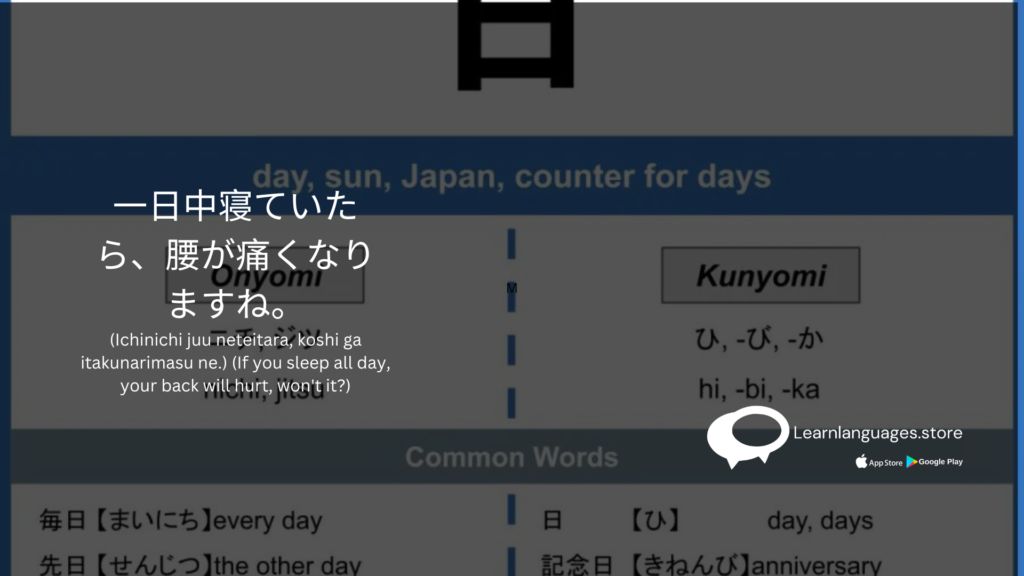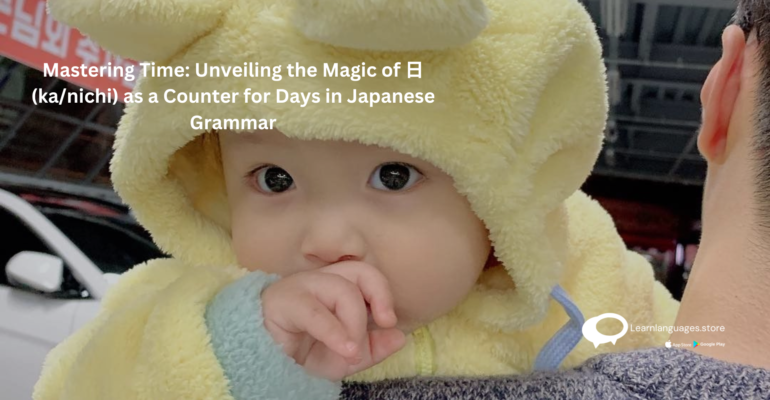Mastering Time: Unveiling the Magic of 日 (ka/nichi) as a Counter for Days in Japanese Grammar
Mastering Time: Unveiling the Magic of 日 (ka/nichi) as a Counter for Days in Japanese Grammar
Estimated reading time: 4 minutes

INTRODUCTION:
Konnichiwa, fellow language enthusiasts! Today, we embark on an exciting journey through the intricacies of Japanese grammar with a focus on 日 (ka/nichi), the versatile counter that allows us to measure the passage of time in days. Whether you’re counting down to a special occasion or reminiscing about past adventures, mastering 日 (ka/nichi) will enrich your Japanese conversations with humor and precision. So, let’s dive into this linguistic adventure together!
What is 日 (ka/nichi)?
In Japanese grammar, 日 (ka/nichi) is a counter used specifically for counting days. It’s like having a calendar at your fingertips, allowing you to mark the passage of time with ease and accuracy. Whether you’re planning a vacation or tracking your progress on a project, 日 (ka/nichi) is your faithful companion for measuring time in days.
Sentence Structure:
The basic structure for using 日 (ka/nichi) is as follows:
[Number] + 日 (ka/nichi)
Now, let’s break it down with some examples:
- 一日 (ichinichi) – one day
- 二日 (futsuka) – two days
- 三日 (mikka) – three days
- 四日 (yokka) – four days
- 五日 (itsuka) – five days
Examples with Humor:
- 一日中寝ていたら、腰が痛くなりますね。(Ichinichi juu neteitara, koshi ga itakunarimasu ne.) (If you sleep all day, your back will hurt, won’t it?) Imagine jokingly warning a friend about the perils of spending an entire day in bed. Ah, the joys of a lazy Sunday!
- 二日間で世界一周するのは無理ですよ。(Futsukakan de sekai isshuu suru no wa muri desu yo.) (It’s impossible to travel around the world in two days.) Visualize gently breaking the news to an overly ambitious friend who dreams of circumnavigating the globe in a mere two days. Ah, the power of dreaming big!
- 三日後に再び会えるのを楽しみにしています。(Mikkago ni futatabi aeru no o tanoshimi ni shiteimasu.) (I look forward to seeing you again in three days.) Picture yourself eagerly anticipating a reunion with a dear friend, counting down the days until your next joyful encounter. Ah, the sweetness of anticipation!
IDENTIFYING IN A SENTENCE :
In Japanese, the counter 日 (ka/nichi) can be identified in a sentence when used to count days, such as in the phrase “三日間の旅行を計画しています” (Mikkakan no ryokou o keikaku shiteimasu), which means “I am planning a three-day trip.” Here, “三日間” (mikkakan) indicates the duration of the trip using the counter 日 (ka/nichi)
Exceptions and Usage:
While 日 (ka/nichi) is primarily used for counting days, there are a few exceptions and nuances to keep in mind:
- Usage with specific days of the month: When referring to specific days of the month, such as birthdays or holidays, the counter 日 (nichi) is often used. For example, 一日 (tsuitachi) means “the first day of the month,” and 十五日 (juugonichi) means “the fifteenth day of the month.”
- Alternative counters: In some cases, alternative counters such as “日間 (nikan)” or “日目 (nichime)” may be used to indicate a duration or the nth day of an event or activity.
Conclusion:
Congratulations, dear readers! You’ve now mastered the art of counting days with 日 (ka/nichi) in Japanese grammar. Whether you’re marking milestones or simply counting down to the weekend, 日 (ka/nichi) is your faithful companion for measuring time with humor and precision.
Arigatou gozaimasu for joining me on this linguistic journey. Until next time, mata ne! 🎌
-
Product on sale
 Japanese N4
Japanese N4₹18,300.00
₹24,300.00 -
Product on sale
 Japanese N5
Japanese N5₹16,300.00
₹18,300.00
Learn Languages Store
Vashi,
Email: services@learnlanguages.store










